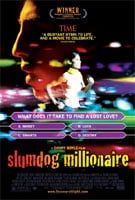Slumdog Millionaire moves with the lickety-split pace of the city in which it's set, Mumbai, where slums become high-rises within a decade and even the smallest children are out to make a buck. Danny Boyle, always a lively director, has found his match here, and he, his enormously talented cast and cinematographer Anthony Dod Mantle plunge headfirst into their story of love, poverty, ambition and always, energy.
But even more importantly, there's also Boyle's continuing sense of good humor and decency, which buoys both the moments of darkness and the eventual fairy tale ending. Scotsman Boyle has not traveled all the way to India to expose the horrors of the slums or seek some half-baked spiritual awakening. He's here to tell a fantastic, fantastical story, one that could only happen in ever-changing, ever-alive India. The conventional story may not have gone far in an English-language or more familiar setting, but with Boyle's kinetic energy and the wonders of another culture, Slumdog turns sparky and vibrant.
At 18, Jamal (Patel) is an average menial laborer in Mumbai, but he's poised to win a fortune on India's homegrown version of Who Wants to Be a Millionaire. The host (Anil Kapoor) is suspicious of how this slumdog could know all the answers, and during an overnight lull in production, Jamal is taken into custody and tortured by some tough cops (among them Indian legend Irfan Khan) to find out how he cheated. Turns out he knows the answers, all of which lie in a series of flashbacks to his past, from the race riot that left him and his brother Samir orphans to their childhood spent as street hustlers, organized by a Fagin type who is willing to burn out the eyes of the best singers so they'll earn double.
Thankfully, Simon Beaufoy's satisfying and twisty script is smarter than the strict Q&A format-- questions posed early in the film aren't answered until the end, and the story movies fluidly between past and present and locations all over India. It's aided by the zippy camera, a Boyle trademark, which turns the tight corners of the slums and flies at the speed of the train on which Jamal and Salim hitchhike. Jamal and Salim's story intersects early on with Latika's, a fellow orphan who meets up with them at various points in their lives. As maturity brings out the violent and ambitious side of Salim, and Latika's beauty drafts her as a kind of courtesan to the wealthiest gangsters, Jamal is left alone to pursue a more mainstream life. But Latika, and to a lesser extent Salim, never fully leave him, and Jamal's TV appearance is his last-ditch chance to bring them all together.
The movie ends so happily there's actually a dance sequence involved, but everything before it has been so consistent that the brief dip into fantasy isn't a problem. The performances are uniformly exceptional, from veterans Kapoor and Khan to the seven-year-old children, speaking only Hindi, who play the young Jamal, Latika and Salim. The actors' enthusiasm, couple with Boyle's energy behind the screen, make magic out of Slumdog Millionaire's songs and sorrow, its bursts of energy and carefully selected moments of reflection. A story of coincidences and luck and eventually fate, it's a classic, perhaps cliched tale-- but one that has rarely felt or looked so alive.
Staff Writer at CinemaBlend
Most Popular




